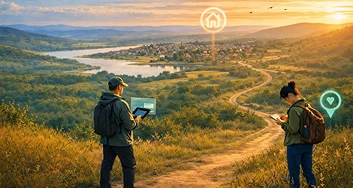Zeynep Mutlu from Skyscanner reveals the key trends that are influencing travel decisions and shares practical guidance for destinations to effectively refine their strategies.
Skyscanner is a world-leading travel marketplace for flights, car hire and hotels. It's available in 32 languages, enabling the localisation of content for each of the 52 markets it serves. With 100 million monthly website users, of which 79% come direct, Skyscanner has access to vast quantities of data that helps them to build and optimise regional marketing campaigns with tourist boards.
Half of Skyscanner's users aim to find inspiration for their next trip, with 41% being unsure about their next destination and 51% being flexible in terms of travel dates. Therefore, visitors use Skyscanner's platform with a blank canvas looking for inspiration for activities and the best time to travel. 73% of Skyscanner's sessions are via mobile, with South Korea and India having the highest penetration.
Just as Skyscanner have been ahead of the curve when it comes to engaging consumers in mobile, so too have they been an early adopter when it comes to generative AI. Skyscanner recently launched their first generative AI-driven tool, 'Dream and Discover', which utilises ChatGPT plug-ins to answer questions any travel-related queries, such as ideal holiday destinations and the best things to do in the area.
Horizons Report
Skyscanner's 2024 Horizons report is based on a comprehensive analysis of search and booking data - with 295 data points globally - and a global survey of 18,000 travellers from 15 countries. The report highlights key patterns that are shaping travel decisions and provides actionable guidance for destinations to optimise their strategies.
Booking Trends and Consumer Preferences
Travellers are increasingly booking further in advance. Following the disruption from Covid, booking windows are now normalising, with visitors planning further in advance. In all regions, the 90+ days booking window share is ahead of 2022 levels, with EMEA showing stability in medium-term booking windows (30-59 and 60-89) compared to 2022. In the Americas, there are fewer last-minute bookings of 7-29 days, while in APAC travellers continue to embrace spontaneous travel as travel restrictions eased more slowly.
When it comes to changing preferences, consumer confidence in travel has increased despite the pressure on global finances. Findings suggest 81% of global consumers will be travelling more or the same in 2024 compared to 2023, while 76% will spend the same or more. The biggest costs are expected to be flights (30%), hotels (21%) and tourist attractions (7%). Meanwhile, travellers are willing to increase spending on travel insurance (36%) - a remnant of the disruption faced by the sector in recent years - seat selection (36%) and business or first-class travel (20%).
Leveraging Technology for Travel Inspiration
Almost half of travellers have used their mobiles to decide upon their travel destination or search for flights. More significantly, 40% of travellers indicated they had booked travel options via mobile. This shows how mobiles are vital in the dreaming, planning and activation stages, with mobile optimisation of content essential for generating conversions and pushing consumers through the marketing funnel.
Also worth noting is how travellers have responded to recent AI developments, with 22% of those surveyed saying they had used AI chatbots. Although, despite the uptake in technology over the last few years, word of mouth still reigns supreme, accounting for 35% of travel decisions. Meanwhile, YouTube (40%) and Instagram (33%) remain vital channels for travel inspiration, showing the enduring importance of social media marketing.
Travel Trends
The top factors when planning holidays are unchanged from the past, with weather (60%), food (58%) culture (54%) and attractions (49%) being the most important for selecting a destination. However, an unheard-of trend for many has been brought about by Gen Z, with 'vibe' (41%) becoming more influential, showing how visitors are now more focused on having great experiences. These are the biggest trending travel vibes for the year:
- Gig Tripping: Travellers are prioritising attending concerts and festivals to see their favourite band or artist whilst abroad.
- Main Character Energy: TV shows and films play a significant role in inspiring travel destinations. Travellers seek out locations featured in their favourite shows or films, hoping to capture the 'main character' experience.
- Budget Bougie Foodies: Culinary experiences remain a top priority for travellers, but they are seeking a balance between affordability and quality. This trend aligns with the growing popularity of food tours, pop-up restaurants and local street food markets.
- Destination zzzz: Travellers are prioritising rest, seeking destinations that offer tranquil environments, wellness retreats and opportunities for rejuvenation.
- Analogue Adventurers: Seeking a break from technology, travellers are embracing digital detoxes and seeking authentic, offline experiences. This trend aligns with the growing popularity of hiking, cycling and exploring hidden gems.
- Celebration Vacationers: Travellers are planning trips around special occasions and milestones, using travel as a way to mark significant life events or anniversaries.
- Lux-for-Less Seekers: Travellers are still seeking luxury experiences, but they are looking for ways to do so without breaking the bank. This trend is driving the popularity of boutique hotels, Airbnb stays and unique accommodation options that offer a touch of luxury at a lower cost.
The most preferred in-destination activities are sampling local food (46%), sightseeing (42%) and going to the beach (40%), especially important for those ranking weather as their top factor for booking travel.
Trending Destinations
With traveller preferences changing, here's a glimpse into the emerging trends shaping destination choices globally:
- EMEA travellers are drawn to hidden gems and exploring off-the-beaten-path destinations:
- Rayong, Thailand
- Ouarzazate, Morocco
- Pristina, Kosovo
- Klagenfurt, Austria
- Castletown, Isle of Man
- American travellers seek vibrant cities, with US travellers prioritising island paradises:
- Joinville, Brazil
- Campinas Grande do Sul, Brazil
- Sapporo, Japan
- Cayman Islands
- Osaka, Japan
- APAC travellers are particularly fascinated by Japan:
- Kita Kyushu, Japan
- Shizuoka, Japan
- Macau, China
- Okayama, Japan
- Kaohsiung, Taiwan





















.webp)
